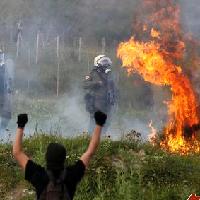
Bitter struggles erupt as EU/IMF policies devastate Greek economy
Keratea is a small town near Athens yet for over four months the residents have been involved in a heroic struggle against the construction of a landfill site in their area. Landfills are the Greek government’s way of ‘dealing’ with waste management. The government is so determined to carry out these plans that the residents have been and still are facing extreme police violence and repression. Recently, residents’ confrontations with the police are taking place daily leading to media references to “scenes from Libya”.
The Greek government, along with the prospective investors, regard waste management as a new business opportunity. Landfill sites are planned in a number of areas throughout the country.
For the vast majority of these sites, what is planned is the burning of waste for electricity production. This waste is falsely called ‘biomass’, as the use of biomass for electricity production is subsidised by the EU. Waste, which is not intended for incineration, along with the toxic ash from the incinerators, will end up in the landfills, literally poisoning the air, soil and groundwater of large areas. And all for the sake of big construction bosses’ profits!
This should make clear that local communities and the environmental movement must coordinate their campaigns towards a comprehensive alternative for waste management. They must not adopt a parochial approach, where the problem would ‘concern’ them only if it affects their own areas. What is needed is a proposal to protect the environment and the quality of life and not “investments of national importance”, which actually translate into profits for waste-constructors.
Media workers’ strikes
With cuts in wages and further ‘flexibility’ of working conditions, the media bosses in Greece have begun a massive offensive against the sector’s workers. Media owners are seeking 15% wage cuts, while not guaranteeing that there will not be any job losses.
Sackings have now become daily. These sackings are often revengefully directed towards trade union representatives and those whose work has a more bold political content.
Under the pressure of the workers, the trade union leaderships were forced to call strikes. Strikes took place in 2010 and the first 24 hour strike in 2011 was on 17 March, followed by two 48 hour strikes, from 7-8 and 9-10 April, with the participation of all media trade unions.
This is a logical response to the bosses’ attacks and an unprecedented escalation as far as the trade unions’ leaderships are concerned. Unfortunately, there is no plan by the union leaderships on how the struggle should continue after the two 48 hour strikes.
A programme of 48 hour strikes (e.g. one every 2-3 weeks) where the complete black out of the traditional media will be accompanied by the publication and distribution of strike bulletins in the service of the strike of the mass media workers but also of any other sector of workers in struggle, would be much more effective than the two consecutive 48 hour strikes. This could set the basis grounds for the unification of many struggles and for the generalisation of the mobilisations.
The context of the bosses’ offensive and the workers’ strike in response is the devastating impact on the Greek economy of the EU/IMF deal. A strategy to defend workers’ rights must include a strategy to defeat the IMF/EU deal.
It is obvious that no sector of the workers’ movement can stop the policies of the government and the bosses on its own because these policies derive from the IMF/EU deal. Either there will be a plan that connects the demands of many sectors of the workers’ movement with broad mobilisations, carrying the threat of overthrowing the government or the government will not back down.

Contract workers occupy Athens City Hall
Around 2,700 contract workers at Athens council are currently occupied the City Hall. The occupation began on 21 March, when a proposal was going to be submitted to the city council to hire 800 new contract workers to replace already employed workers.
Contract workers in Athens council are often the majority of staff and without them the council would not have been able to function. These workers have no hope of becoming permanent staff, as they are regarded as cheap labour and have no guaranteed employment rights.
The occupation was not planned beforehand but when the workers decided to mobilise against the proposal they spontaneously entered the City Hall.
From the first day, an occupation committee was created, so that it would practically organise the occupation and so that the contract workers could try to decide the course of their struggle.
Xekinima (CWI Greece) called for the occupation to be only the beginning of the struggle and for democratically-run occupations to be expanded to the contract workers of other councils and other workplaces in the public sector, and to be co-ordinated by committees. Xekinima also called for co-ordination with the rest of the (non-contract) workers, as well as for the GSEE (private sector and public utilities union federation) and ADEDY (public sector’s union federation) to organise mobilisations in solidarity.
However, after 26 days the occupation of the Athens City Hall was ended, on 15 April, by means of an open sell out by the leadership of the trade unions representing Athens city council workers (those with permanent employment). They declared the end of the occupation, without giving the workers the right to discuss it in a general meeting and vote on it! Xekinima-supporting workers taking part in the occupation publicly accused the union leaders of betrayal and accused them of being “cowards afraid to even allow the workers to vote”. These Xekinima supporters will discuss with other militant rank and file workers to see if the struggle can continue, even by other means, based on rank and file committees, in the immediate period ahead.


Be the first to comment